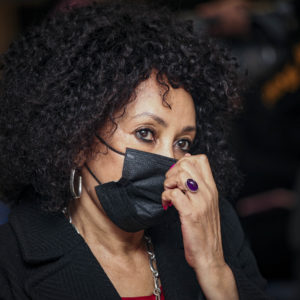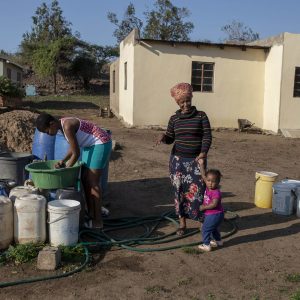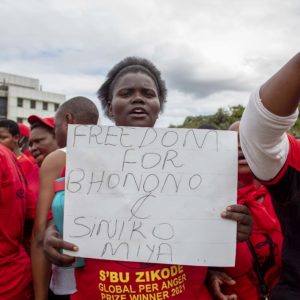A predatory elite aims for further licence
When the kleptocrats gun for the Constitution and judiciary, they cynically dress their wholly destructive desire for elite impunity in the language of general emancipation.
Author:
14 January 2022

Minister of Tourism Lindiwe Sisulu’s vituperative attack on African judges, first published on the website of the entirely discredited IOL, has provoked a firestorm of largely liberal critique. Her article is Trumpian in its crassness and its disregard for historical reality, which includes the elision of the generations of Black lawyers who advanced a constitutional vision of an emancipated future.
The attack on the judiciary has been widely understood as an attempt to delegitimate it in the wake of Jacob Zuma’s sentencing to prison, the release of the first volume of the Zondo report on state capture, and the recommendations to pursue criminal cases against politically connected people like Dudu Myeni, Tom Moyane and Brian Molefe. It is clearly a cynical attempt to misuse the immiseration of the majority, a deeply and painfully racialised reality, to legitimise an often kleptocratic and sometimes violent and criminal political elite.
Related article:
This elite has not only failed to build a more just society, but has actively and cruelly worsened the conditions of oppression. It is uniformly opposed by the mass-based organisations of the working class and the impoverished. In many instances, their opposition has come at the cost of arrests on bogus charges, assault, torture and murder by the police or izinkabi – assassins.
Sisulu is not wrong to note that systems of oppression are often, in their own terms, legal. She is also not wrong to note, though in an extraordinarily crude fashion, that law is a consequence of history – it is always a record of the balance of forces at a particular moment.
An unequal footing
The mediation of the law through the courts is never equally open to all for the simple reason that, outside of limited and often constrained opportunities to receive pro bono legal support, access to the courts requires money to pay lawyers. When access to the courts is gained, it seldom occurs on neutral ground. Massive advantages are gained with the money that can enable access to good lawyers, and their time and resources.
In the magistrate’s court it is far from uncommon to encounter judicial officers and state prosecutors who are brazenly hostile to impoverished Black people, and even more so to people engaged in organised resistance to oppression.
But while the ruling party and the state relentlessly use the law and the courts to entrench oppression, sometimes, as in Durban at the moment, with the active complicity of the prosecuting authority, oppressed people also seek to use the law with equal vigour to advance their own interests. Many significant battles have been won in the courts.
Related article:
Some of the best-known judgments against the state have not resulted in material advances. The judgment in favour of Irene Grootboom in the Constitutional Court in 2000 affirmed the right to housing in elegant prose. But Grootboom died in a shack, the provision of state housing is in steep decline and many more people live in shacks today than back then.
Other judgments have resulted in important social progress. One of the best known is the case brought against the minister of health by the Treatment Action Campaign in 2002 that forced the state to provide medication to pregnant women to prevent mother-to-baby transmission of HIV.
A clear failure
Sisulu has been a member of Parliament since 1994 and has held eight ministerial positions. She is not considered to have made advances in any of these portfolios. Her sudden expression of concern for the immiserated majority, and her claim that their suffering is consequent to the Constitution and judiciary, conveniently ignore the fact that the ANC has held state power for close to 30 years, during which both poverty and inequality have worsened. It is also spurious. There are no cases in which the ANC tried to pursue a programme of radical redress only to be thwarted by the courts.
In her two terms as minister of housing, Sisulu made no progress in addressing the housing question, which is also a land question, and she became notorious for a high-handed and authoritarian approach. During her first term she failed to implement the Breaking New Ground policy, officially adopted in 2004, which recommended democratic engagement with communities with a view to upgrading settlements where they are. Under her watch the constitutional protection against the summary eviction of unlawful occupiers of land was also routinely ignored as the state remained the primary perpetrator of unlawful and often violent evictions.
Related article:
In 2007, after residents of the Joe Slovo settlement along the N2 in Cape Town resisted forced removal to the “human dumping ground” of Delft, in the wastelands far outside the city, Sisulu infamously remarked that “if they choose not to cooperate with government, they will be completely removed from all housing waiting lists”. This statement put her well to the right of the Constitution.
In 2014, announcing that people under 40 would no longer be eligible for public housing – a position with no basis in law – she declared that “none of you are ever going to get a house free from me while I live” and that “you have lost nothing [to apartheid]”. She also said, in direct violation of the commitment to provide housing in the Constitution, that “free housing in a few years will be something of the past” and added, in the spirit of Margaret Thatcher, that “we want our young to grow up and be self-sufficient, we don’t want them to be dependent on the state”. Again her position was far to the right of the Constitution.
Taking aim at shack dwellers
This is not the only time that Sisulu has found herself in this position. In 2005 she announced that “slums” – shack settlements – would be “eradicated” by 2014. In 2007 she enthusiastically backed the so-called Slums Act passed by the provincial legislature in KwaZulu-Natal. It was a highly repressive and authoritarian piece of legislation that, closely following colonial legislation such as the 1951 Prevention of Illegal Squatting Act, forced municipalities and private landowners to evict shack dwellers. It was legislation against the expropriated, not in support of them. It was a direct attack on urban land reform undertaken from below that could only result in an escalation of state violence against impoverished people.
The campaign against the act, led by Abahlali baseMjondolo, was met with state violence as people protesting against it were beaten, shot with rubber bullets and arrested. Abahlali took its struggle against the act to the courts, a choice that was met with extreme hostility by powerful figures in the ANC in Durban and in KwaZulu-Natal. Prominent members of the movement were threatened, and in September 2009 the homes of a number of its leaders in the Kennedy Road settlement were attacked and destroyed by armed men. Key figures in the provincial ANC endorsed the attack, and the pending case was mentioned in their general presentation of the movement as an illegitimate actor. Sisulu expressed no concern about the repression of Abahlali. The following month, the Constitutional Court found key parts of the act to be in conflict with the Constitution and struck them down.
Related article:
The Constitution is not a sacred text. It is a political document, forged in a certain historical moment and open to critique and debate. There is no doubt, though, that in this case it offered protection to the oppressed against Sisulu’s deeply reactionary political stance, and that there are many other instances in which it has offered protection to the oppressed against the ANC.
Sisulu’s attack on the Constitution and the judiciary is not an attack on barriers to progressive social change. It is an attack on one of the few barriers to the desire for fuller impunity by a deeply corrupt and often repressive political elite that has treated the oppressed with gross contempt. This corrupt political elite, which Sisulu wishes to lead, is a direct threat to the interests of the majority, and to the possibility of building a viable and just society.




